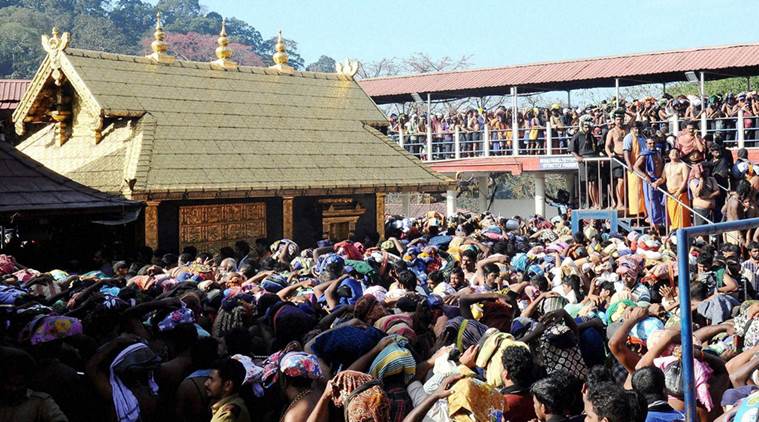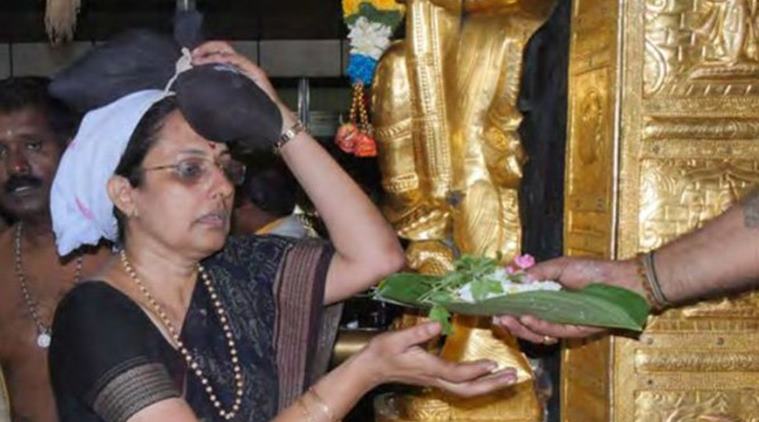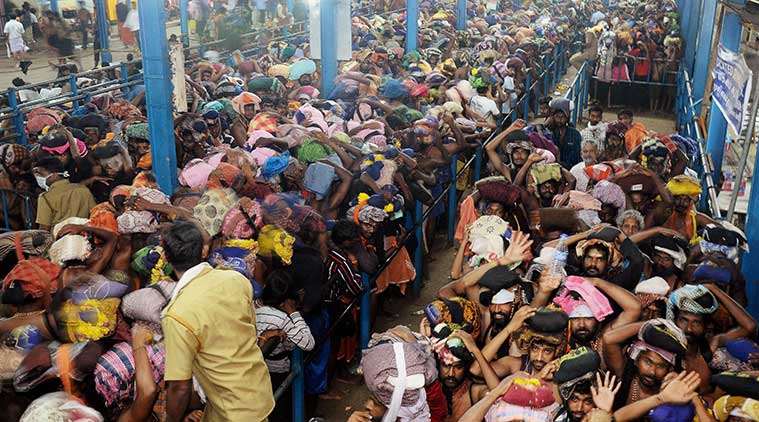 The Sabarimala Shrine which is one of the most famous temple’s in Kerala. (File)
The Sabarimala Shrine which is one of the most famous temple’s in Kerala. (File)
Ending an age-old practice, the Supreme Court Friday said women should be permitted to enter the Sabarimala temple in Kerala dedicated to Lord Ayyappa. The five-judge Constitution bench headed by Chief Justice Dipak Misra, in its 4:1 verdict, said banning the entry of women into the shrine amounts to gender discrimination and the practice violates the rights of Hindu women.
The court pronounced its verdict on a clutch of pleas challenging the ban on the entry of women into the Sabarimala temple, saying that law and society are tasked with the task to act as levellers. Follow LIVE updates
What the judges said
Chief Justice Dipak Misra said devotion cannot be subjected to discrimination.
“Patriarchal rules have to change, and that patriarchy in religion cannot be allowed to trump the right to pray and practice religion,” the CJI said. Any rule based on biological characteristics cannot pass muster of the constitutional test, he said.
“The Kerala Hindu Places of Public Worship (Authorisation of Entry) Rules, 1965, violate the right of Hindu women to practice religion. The practice of age restrictions on women entry to Sabarimala temple cannot be treated as essential practice,” Chief Justice Misra wrote on his behalf and Justice Khanwilkar.
Justices R F Nariman and D Y Chandrachud concurred with the CJI and Justice A M Khanwilkar, but wrote separate judgments.
“The custom of barring women is violative of Article 25(1). Rule 3(b) of Kerala Hindu Places of Public Worship (Authorisation of Entry) Rules, 1965,” wrote Justice Nariman. “Fundamental Rights under PART III of Constitution is essential for the transformation of a society,” he added.
Justice Chandrachud, in his judgment, said not allowing the woman to enter because they are of procreating age is “derogatory” to them. “To exclude women of the age group 10-50 from the temple is to deny dignity to women. To suggest that women cannot undertake the 41-day vratham is to stereotype them.”
“Religion cannot be cover to deny women right to worship. To treat women as children of lesser God is to blink at Constitutional morality,” he added in the obseravtion.
 Women of all ages are equal worshippers of Lord Ayyappa. (Source: ANI)
Women of all ages are equal worshippers of Lord Ayyappa. (Source: ANI)
Justice Indu Malhotra had a dissenting view
Justice Malhotra, the only woman on the bench, said worshippers of Sabarimala temple do not constitute a separate religious denomination and said the petition did not deserve to be entertained.
“Issues of deep religious sentiments should not be ordinarily be interfered by the court. The Sabarimala shrine and the deity is protected by Article 25 of the Constitution of India and the religious practices cannot be solely tested on the basis of Article 14,” she said in her judgment.
Adding that the judgement won’t be restricted to the Sabarimala shrine, Justice Malhotra said that the present judgment won’t be limited to Sabarimala, and “will have wide ramifications”. Issues of “deep religious sentiments shouldn’t be ordinarily interfered into,” the judge said. Read the full judgment here

Sabarimala verdict disappointing: Temple head priest
Disappointed by the verdict, Travancore Devaswom Board President A Padmakumar said that the Supreme Court’s verdict will be studied in detail and the next course of action will be decided after that. Padmakumar said the board had informed the court that they wanted to continue with the existing ritual practices, but now they have no other option but to implement the verdict.
“The board will take steps to execute the apex court directive,” he said.
Review petition to be filed
Rahul Easwar, President of the Ayyappa Dharma Sena, said they were going for a review petition. Easwar is the grandson of late Sabarimala priest Kandararu Maheswararu, who died in May this year. A member of the Pandalam Royal family member said the verdict was “painful” for the family. “Every temple has its own tradition and ritual practices and the same has now changed with a court verdict,” he said.
What is the Sabarimala temple case?
The Sabarimala shrine, which is one of the most famous temples in Kerala, had barred women “of menstruating age” from entry. A group of five women lawyers had moved the apex court after the Kerala High court upheld the centuries-old restriction, and ruled that only the “tantri (priest)” was empowered to decide on traditions.
Senior Advocate Indira Jaising, who represented the petitioners, said the restrictions went against Articles 14, 15 and 17 of the Constitution. She argued that the custom is discriminatory in nature and stigmatised women and that women should be allowed to pray at the place of their choice.
In July 2018, just before reserving the verdict in the case, the apex court, after an eight-day hearing, had observed that everyone can enter Sabarimala regardless of their sex. “A woman’s right to pray was not dependent on any law but is a Constitutional right,” the bench had observed, and “what applies to a man applies to a woman as well”.